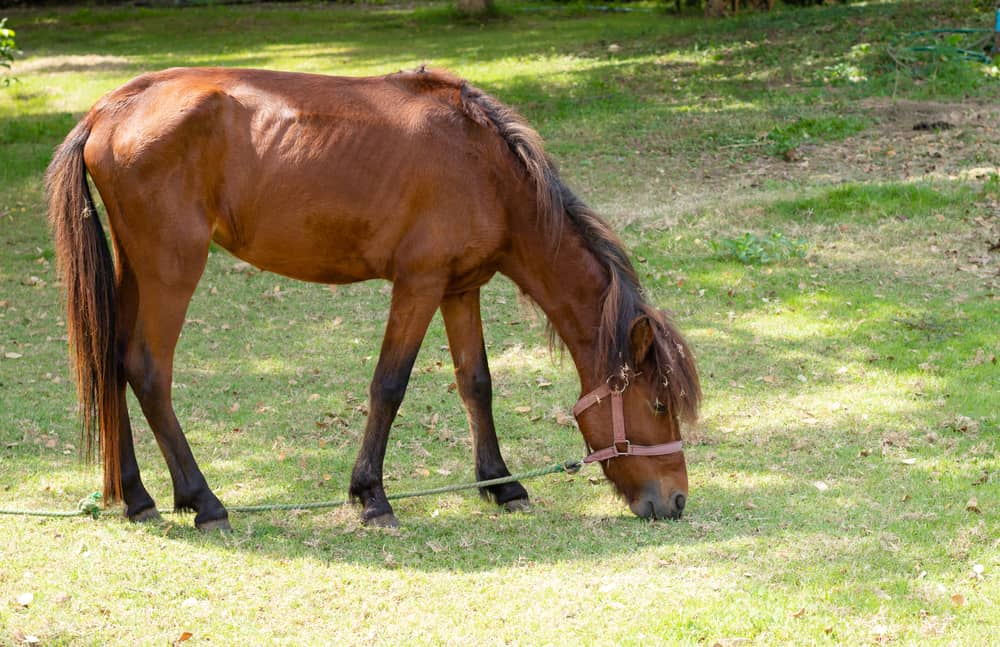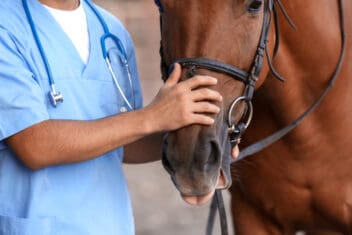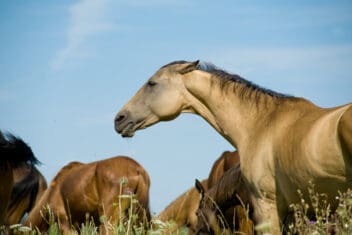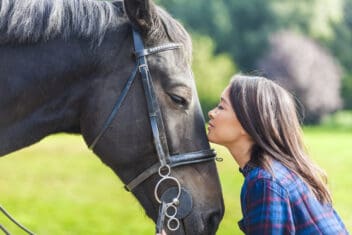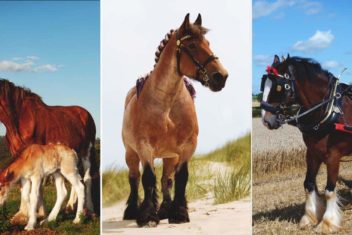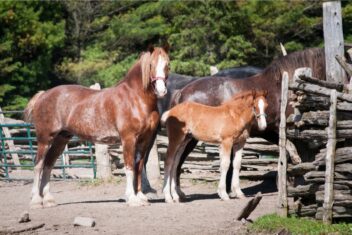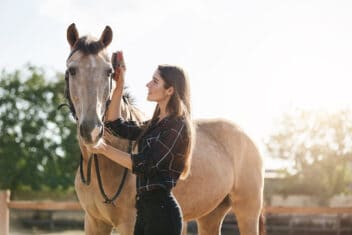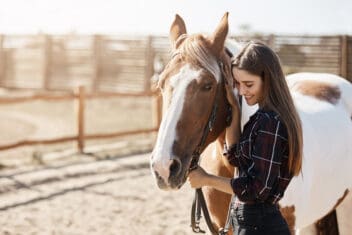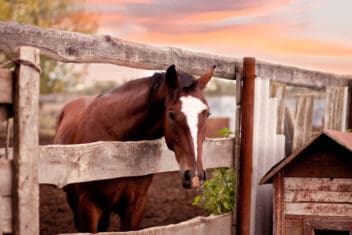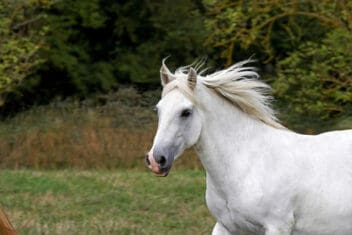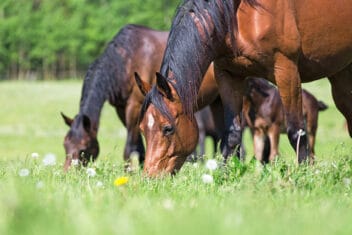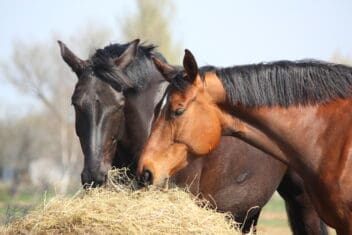Looking after horses can be challenging. There are so many elements to balance to keep your horse healthy. Maintaining the right weight on your horse is a major part of your responsibilities as a horse owner.
For instance, without access to forage, many horses lose weight and struggle in the winter. Some horses develop illnesses that cause them to lose weight. Other times, horses don’t have access to fresh water or enough fodder. Or perhaps their teeth are getting too long.
As an animal owner, it’s your responsibility to recognize the signs of malnutrition and to step in to ensure that your animals have everything they need. Here’s what to know about maintaining your horse’s healthy weight:
Understanding the Metabolism of Horses
Similar to humans, animals have different metabolic rates based on their breed, age, and lifestyle. In the horse world, a “hard keeper” typically needs extra calories to function daily.
If this is your first time owning a horse, you might not even know that your animal is a hard keeper. What that means is that your animal has a higher metabolism than some others.
Pound for pound, thoroughbreds typically “run hotter,” meaning they burn more calories simply existing than, say, a draft horse. It’s not unheard of for a 1,000-pound thoroughbred to need as many calories to keep weight on as a 1,400-pound warmblood does.
The personality of your horse can also impact its metabolism. An anxious or extremely curious horse will eat more than an older, calmer horse.
Then, of course, you have to take activity level into account. Horses with a strict training routine or a busy living environment will also eat more than usual. Horses that have access to a big grass area where they can run or play might burn more calories, as well.
These factors must be considered when determining how much food your horse needs to maintain its weight.
How to Put Weight on Your Horse
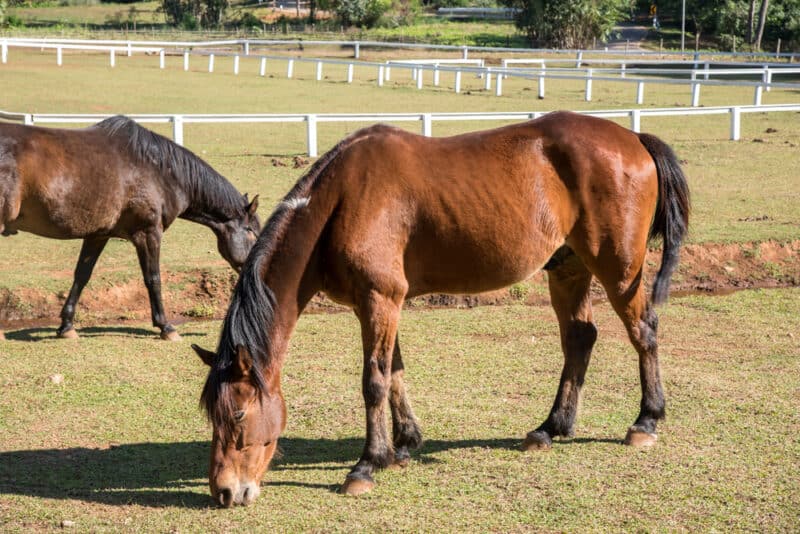
There can be many reasons why your horse has lost weight. Often, the signs don’t appear until the problem has been occurring for several months. That’s why it’s essentially to check your horse daily to see if you can see or feel their ribs.
This is especially important if your horse is wearing a blanket. A lot of problems can hide under their winter wear.
The first step for putting weight on your horse is finding the root cause of the weight loss. Not all horses will lose weight because of their metabolism, so you need to do a general health check, including looking at their teeth and gums.
Here’s what to do if they’re losing or won’t maintain their weight:
1. Check Their Teeth
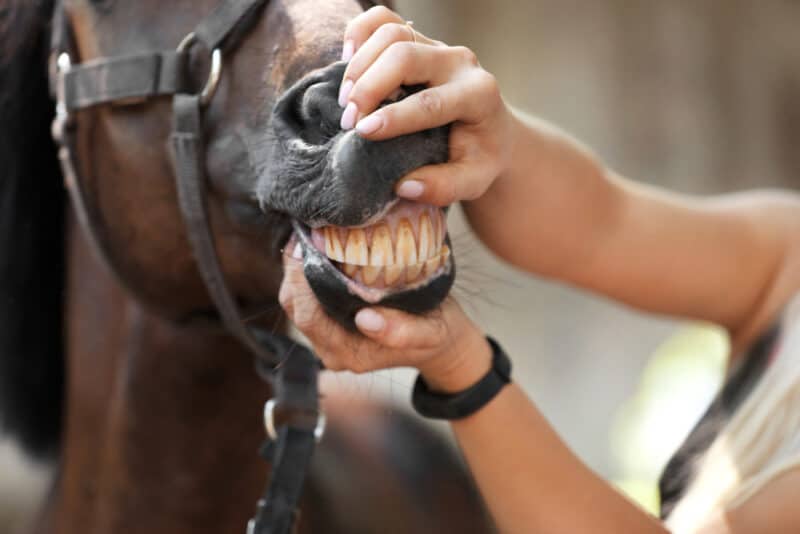
The condition of your horse’s teeth is a big part of how much they can eat. Imagine trying to chew hard food with sensitive or uneven teeth. Their teeth must be kept at the right length and evenness to allow them to eat.
If their teeth are too long or uneven, or have sharp edges, it can damage their mouth and make it hard for them to chew their food. You might notice that their teeth are too long if they continuously drop their food when eating or have blood on their gums.
The simple solution to this problem is to have their teeth regularly floated. Floating is when a veterinarian uses a file to gently even out your horse’s teeth. Generally, you should have your horses’ teeth floated at least once a year.
Contact your veterinarian to have your horses’ teeth floated. Some horses will require mild sedation for the process. It’s also complex, so don’t try to do it yourself.
2. Always Have Fresh Food and Water Available
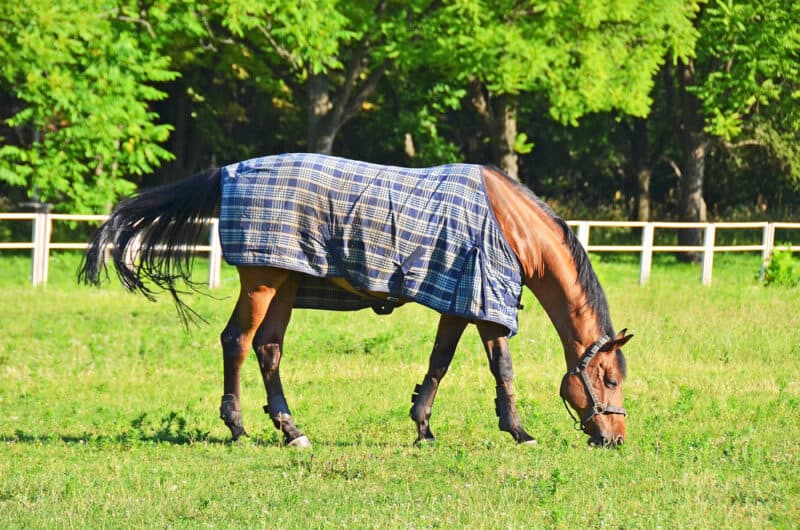
This might seem like an obvious tip for putting weight on your horse, but if your horse doesn’t have constant access to fresh food and water, they won’t be able to get enough nutrients. Horses need around 1.5 worth of their body weight in forage or fodder to maintain a healthy weight.
These are large animals that need a lot of hay and water! If they don’t have the correct diet of hay and water, they will start losing weight and becoming slower. A horse that was once full of energy might become lethargic.
Food can come in the form of fodder, which is stuff like dried hay or grass, or forage, which is live food that your horse can graze. You can have hay delivered if you don’t have your own supply. Just plan ahead of time so that your supply doesn’t run out before the next delivery.
In some areas, obtaining and delivering hay can take weeks or months and some types of grass or hay can run out. If that happens and you need to switch your horse to a different type of fodder, you want a few weeks to transition slowly between the two.
In other words, keep an eye on your stockpile and be ready to re-order weeks or months in advance.
3. Feed Alfalfa
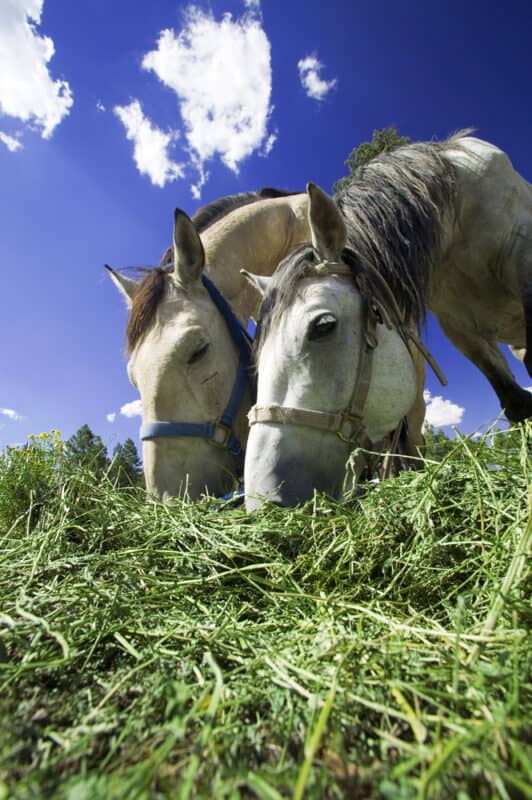
Alfalfa is the best fodder to use when putting weight on your horse. Compared to timothy, orchard, or gray, alfalfa contains more calories per pound, plus more protein and calcium, which is perfect if you need to bulk up your horses’ diet with plenty of nutrients.
Alfalfa hay will help your horse put on weight and improve their coat. You can mix a combination of other types of fodder and alfalfa, which is what most people do, to give them a balanced diet.
Remember that some horses will put on weight fast if they aren’t active. You need to be mindful of older horses with alfalfa, as this can cause the opposite weight loss problem and make them put on more weight than you want.
You don’t have to use bales of hay, either. If you want, you can supplement regular fodder with alfalfa pellets or cubes.
You can keep alfalfa pellets and cubes in storage if you don’t have space for large alfalfa hay bales, or if your supply is irregular. This can be a brilliant solution if you have a small farm and only one or two horses, as you might be limited in space.
Just remember that forage is best, and pellets should be an addition to their diet, not the main diet. They should be used to help the horse gain and maintain weight, not to replace forage.
As long as your horse gets a good amount of alfalfa in their diet they should put on some weight within a few weeks, so long as they’re healthy otherwise.
We have to note that some people believe that alfalfa makes horses “hot,” crazy, or spooky. There have been multiple studies debunking this, but many horsepeople insist that it’s true.
The reality is that since alfalfa has more calories, it’s easy to overfeed your horse. Excess calories result in excess energy, so a horse that is normally calm might suddenly start running around after a few weeks on alfalfa. It’s because they have more calories than they need, not because of the type of food they’re eating.
4. Increase Caloric Intake
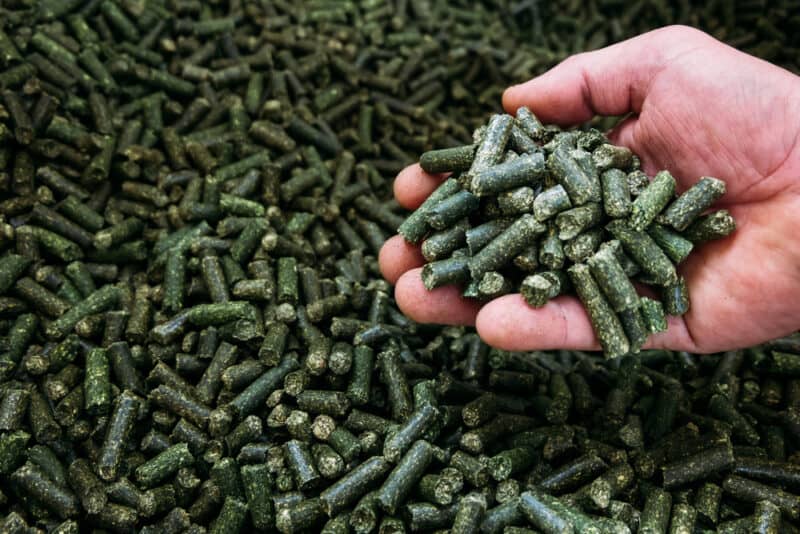
It’s possible that more food won’t cure the weight issue, so you might have to consider increasing your horse’s calorie intake in other ways. This can be done with supplements and oils.
Your horses need a balance of fats and other nutrients to be healthy. We aren’t looking just to put fat on your horses. We also want them to build muscle or keep the muscle they already have. Supplements help with this.
Avoid feeding oats, corn, and wheat. This used to be the norm in the past, but we know better now. You want to focus on nutrient-dense foods and avoid giving a ton of supplements.
A lot of people believe that if one supplement is good, more is better. But the truth is that supplements can conflict with one another and cause nutrients to bind up. Some don’t do what they claim to, which is why people say horses that take a lot of supplements have “very expensive urine.”
Rice bran, beet pulp, ground flaxseed, flax oil, and/or a good vitamin supplement can do wonders for helping your horse put on the pounds.
Ignore all those expensive supplements advertised as helping your horse build weight. The stuff mentioned above is really all you need.
5. De-Worm Your Horse
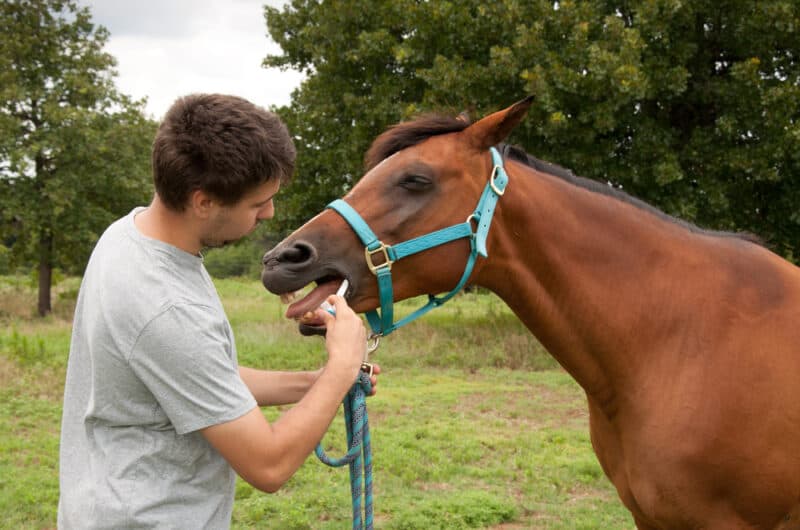
De-worming is vital for your horse’s overall health, but it’s especially important if you’re looking for ways to help them put on weight. If your horse is suffering from worms, it cannot get the nutrients they need from its food.
Back in the day, people used to de-worm regularly whether the horse needed it or not. Every month or every few months, people would give their horses a dewormer. Now we know better.
Test your horse’s poop before deworming. It’s cheap and easy. You just use a kit to scoop up some fresh poop and mail it to the many company. There are many companies out there that test feces, or you can take the sample to your vet. You will get a result back telling you what your horse’s fecal worm egg count is.
It’s normal to have some worms. It’s a sign of a typical, healthy gut. But too many worms cause serious problems, like:
- Hair loss on their body and tail
- Lack of energy and lethargy
- Dull coat with no shine
- Decrease in appetite
- Unexpected weight loss
Once you get your test back, if it indicates you need to deworm, have your vet do it, or you can buy dewormer and do it yourself. Just be sure to buy the right kind of dewormer for the kind of worms your horse has.
Note the de-worming dates in your calendar or notebook so you know when to test again. If your horse had a high level of worms, you’ll probably want to test again in a few months. If your horse didn’t need deworming, check every six months.
6. Take Care of Their Mental Health
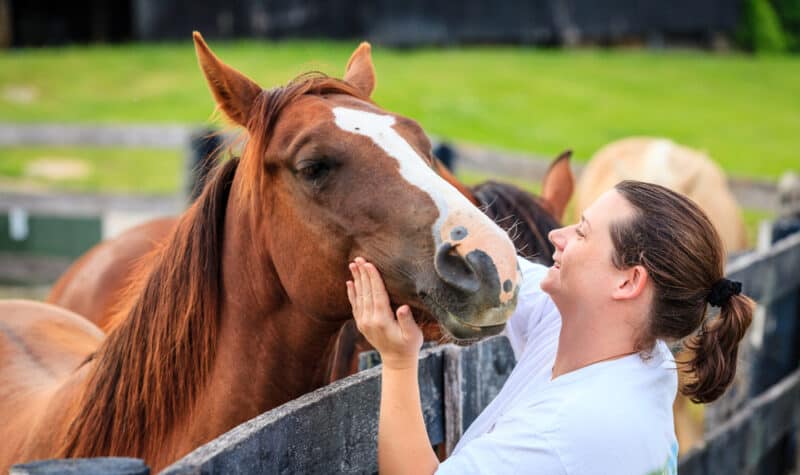
Now that we’ve covered all the medical reasons your horse might lose weight and what to do about them, it’s good to mention your pet’s mental well-being. This is particularly important if you have a horse that enters competitions and is in regular training.
These activities can be mentally taxing and stressed horses might ignore their food.
If your horse is kept in an area with a lot of activity, this can also cause a lot of stress for the animal, which is why you need to take some precautions for their mental and physical health.
Routine is great for giving your horse predictability. Horses are also social animals that crave the company of other horses and their trusted people. A solo horse definitely needs a companion animal.
You also want to avoid boredom. A horse in training can get sick of the same routine. Try mixing up their exercise routine and take them on scenic walks or rides. Or you can try playing games with them.
Your horse also needs regular access to the great outdoors. Life in a stall is stressful and boring.
Above all else, it’s essential that you give your horse rest and relaxation as much as possible. Spend time with them outdoors, keep them warm in winter, and give them all the delicious nutrients they need.
These tips will help them put on weight and improve their mood so you can continue bonding with them over the years.
